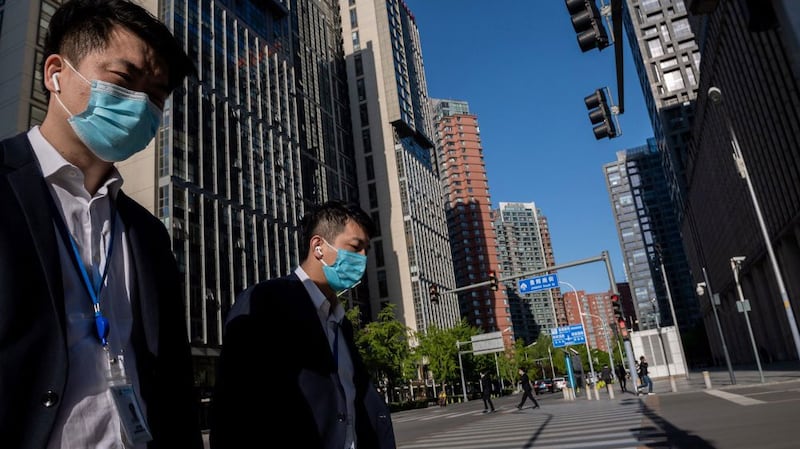A government employee in the central Chinese province of Hubei, worst-hit by the coronavirus epidemic, is sueing the provincial government over its handling of the outbreak, as local residents said they fear a fresh wave of infections.
Tan Jun, a civil servant from the Yangtze river town of Yichang, filed the lawsuit at the Wuhan Intermediate People's Court calling the government to account for the unprecedented loss of life and property as a result of the pandemic.
Tan, who works as a government administrator at Yichang's Children's Park, declined to comment when contacted by RFA on Thursday.
But a copy of the lawsuit seen by RFA accuses the Hubei provincial authorities and the Wuhan municipal government of covering up the fact that the coronavirus that causes COVID-19 can easily be transmitted between human beings.
Tan cites a Jan. 11 notice issued by the Hubei health commission denying that person-to-person transmission existed.
But the State Supervisory Commission said in a report into the reprimanding of late whistleblowing doctor Li Wenliang published March 19 that human-to-human transmission was known about as early as December, according to Tan's lawsuit.
The Wuhan People's Congress also knew that the virus was transmissible between people, but gave the go-ahead for the 10,000 Families Banquet at Baibuting, which gave rise to a large cluster of infections, the lawsuit said.
"The authorities' concealment and playing down of the epidemic caused people to neglect prevention measures ... and gave rise to the rapid spread of the virus," Tan's lawsuit alleges.
He said the people of Hubei had suffered "unprecedented loss" of life and property as a result, and called on the authorities to be held accountable, to apologize to the people of Hubei, and to pay the costs of litigation.
Hubei residents face discrimination
Hubei resident Wu Lijuan applauded Tan's lawsuit.
"The government covered up the true situation ... they should be held responsible," Wu told RFA. "Now, when people from Hubei go to seek
work in other provinces, they are discriminated against."
"Some companies won't hire people from Hubei, and landlords won't rent accommodation to them," she said. "This epidemic has hurt everyone in Hubei a great deal."
"If the government had told people about the epidemic sooner, there wouldn't be so many people suffering now," Wu said.
Tan declined a request for an interview when contacted by RFA on Thursday.
"Sorry, I can't give interviews right now: there are rules about that," he said. "The legal process is under way, and proceeding slowly."
A duty officer who answered the phone at the Wuhan Intermediate People's Court referred inquiries to the litigation department.
But the number supplied rang unanswered during office hours on Thursday, while the Hubei provincial government helpline returned a busy signal.
A Guangdong lawyer surnamed Zhang said the case was unlikely to win, however.
"It is problematic because there is the matter of compensation," Zhang said. "They would need to hold somebody responsible."
"And if this lawsuit is successful, then many more people will bring cases," he said. "So they won't let this case be successful."

Fresh infections in hospitals
He said the authorities are likely to use delaying tactics for the time being, until public attention has dwindled away.
Meanwhile, Chinese premier Li Keqiang has warned of fresh clusters of coronavirus infections centered on Chinese hospitals.
A Hubei resident said his neighborhood had seen restrictions on people coming in and out reimposed since the lifting of the province-wide lockdown.
"The government won't let us go back to our homes, and it won't say why," the resident said. "They have told us to find somewhere else to stay temporarily."
Guangzhou current affairs commentator Wang Aizhong said coronavirus continues to spread in China; it's just not being reported.
"The situation is entirely opaque regarding the number of people infected," Wang said. "The rest of the world has no idea how bad things are."
Shanghai resident Xu Peiling said hospitals are still apparently worried about cross-infection.
"Yesterday I went to the hospital to see a doctor, and they seemed pretty nervous," Xu said. "We had to line up to get our temperature taken, then fill out forms ... before I was allowed to see a doctor."
Yichang resident Liu Jiacai said many employers are still too worried about the epidemic to resume work.
"If people are gathered together again, they may get infected with the virus," Liu said. "But [the government] can't disclose this to the international media or the rest of the world because they have announced to the whole world that China has beaten the coronavirus."
Liu said many residential communities in Yichang are still operating restrictions, including facial masks, a health status code system, and access cards for people cleared to move around.
Reported by Wong Lok-to, Qiao Long and Man Hoi-tsan for RFA's Mandarin and Cantonese Services. Translated and edited by Luisetta Mudie.
